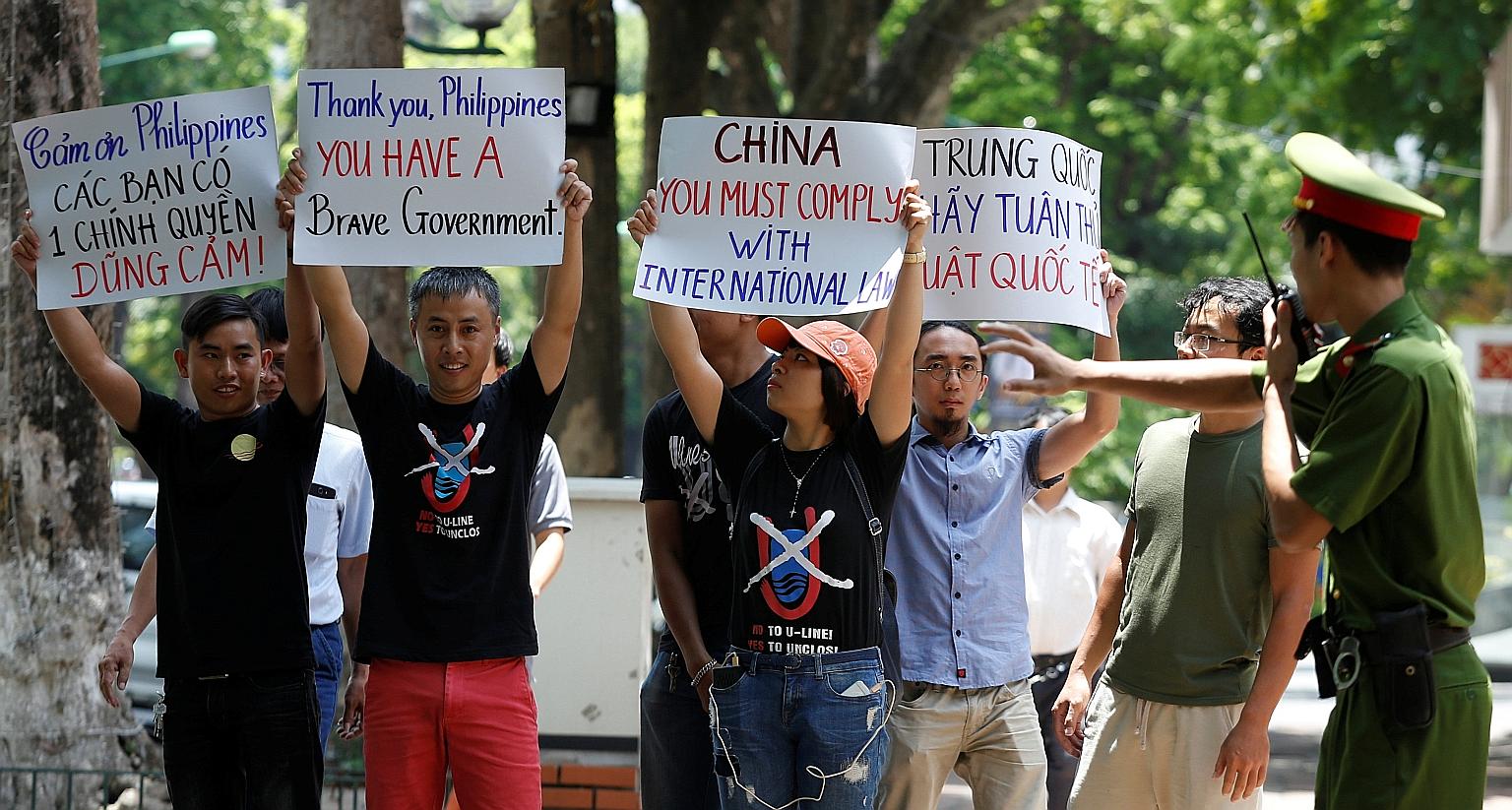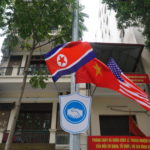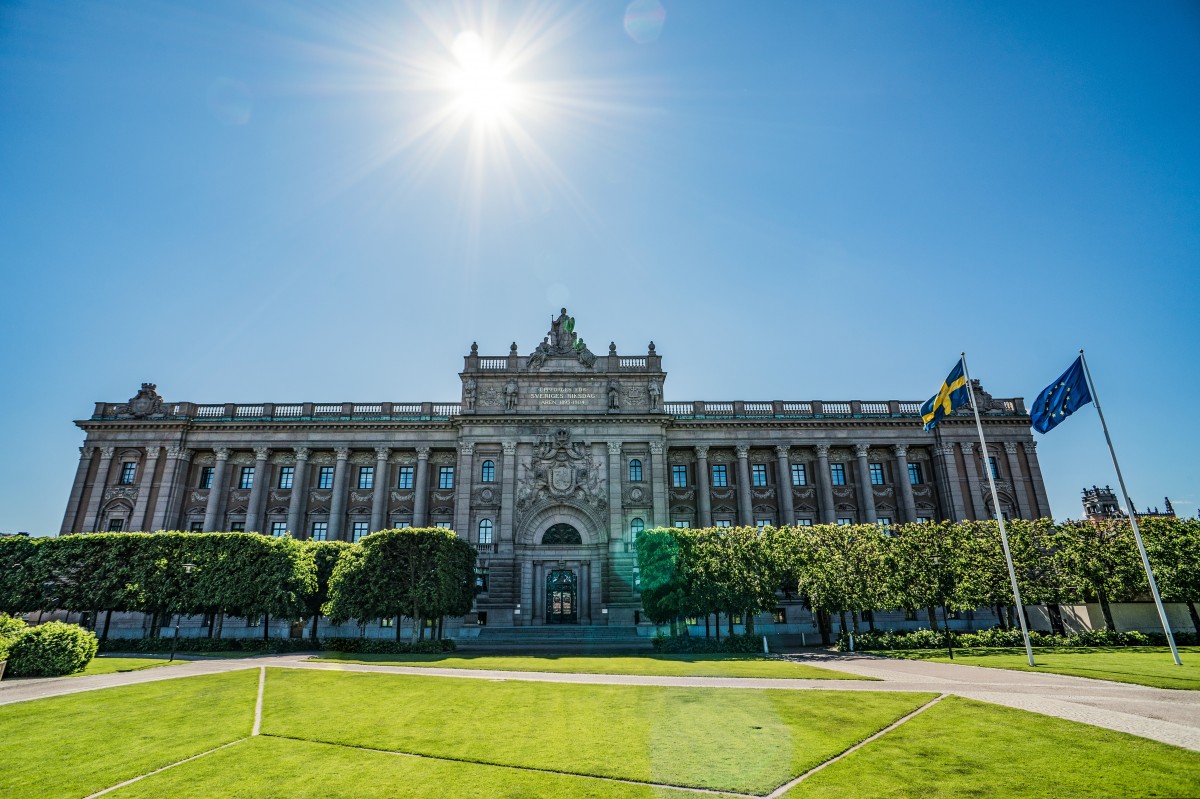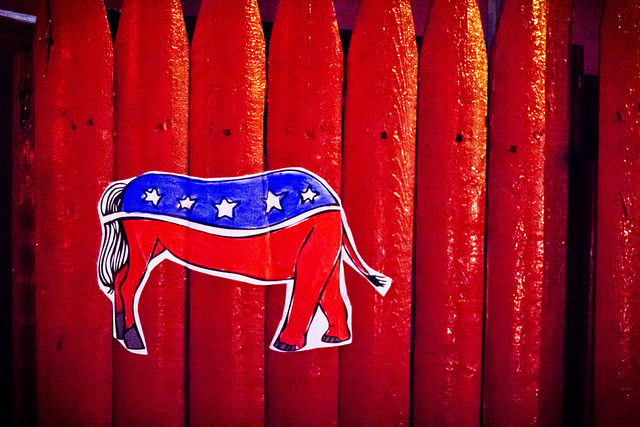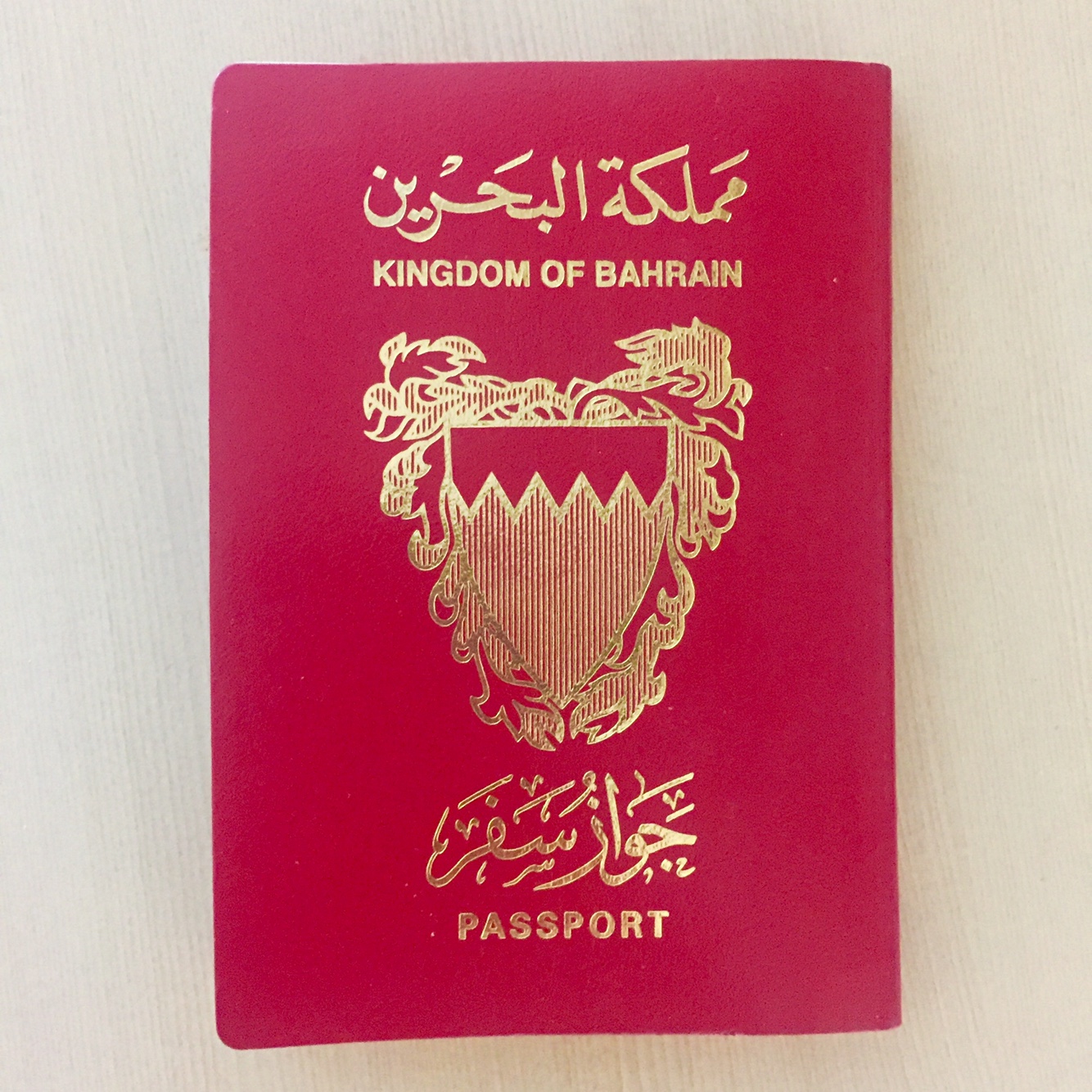Sino-phobia in Vietnam has long roots, but there is more to it than history, argues contributor Luu.
A few years ago, as I passed through the entrance of a shopping mall in Saigon together with a friend, a wall-size print of Chinese actress Tang Wei instantly caught my eyes. Without putting much thought into it, I remarked that her beauty was truly timeless.
“What’s so nice about these Communists?” my friend replied and then added a racial expletive, “they’ve been trying to invade our country since time immemorial.”
I downplayed her foul language as nothing more than a slip-up from a grouchy friend, but it turns out that her remark presaged a resurgence of nationalist sentiments that would erupt on Vietnamese social media only months later.
Anti-China sentiments
The early July of 2016 saw Chinese celebrities – most of whom idols at the peak of their careers and enjoying huge fandoms in Vietnam – embroiled in a public show of patriotism. An international tribunal’s ruling over Chinese territorial claims in the South China Sea came down in favor of the Philippines met with resistance in China. Celebrities digitally shared images of the Beijing-endorsed map of the South China Sea featuring the infamous “nine-dash line”. Quickly, Vietnamese netizens responded in kind, taking to social media to denounce Chinese celebrities’ chauvinism, decry the undeserved popularity of Chinese entertainers in Vietnam, and avow allegiance to their motherland. Facebook quickly became ablaze with offensive comments directed not only at China but anything Chinese.
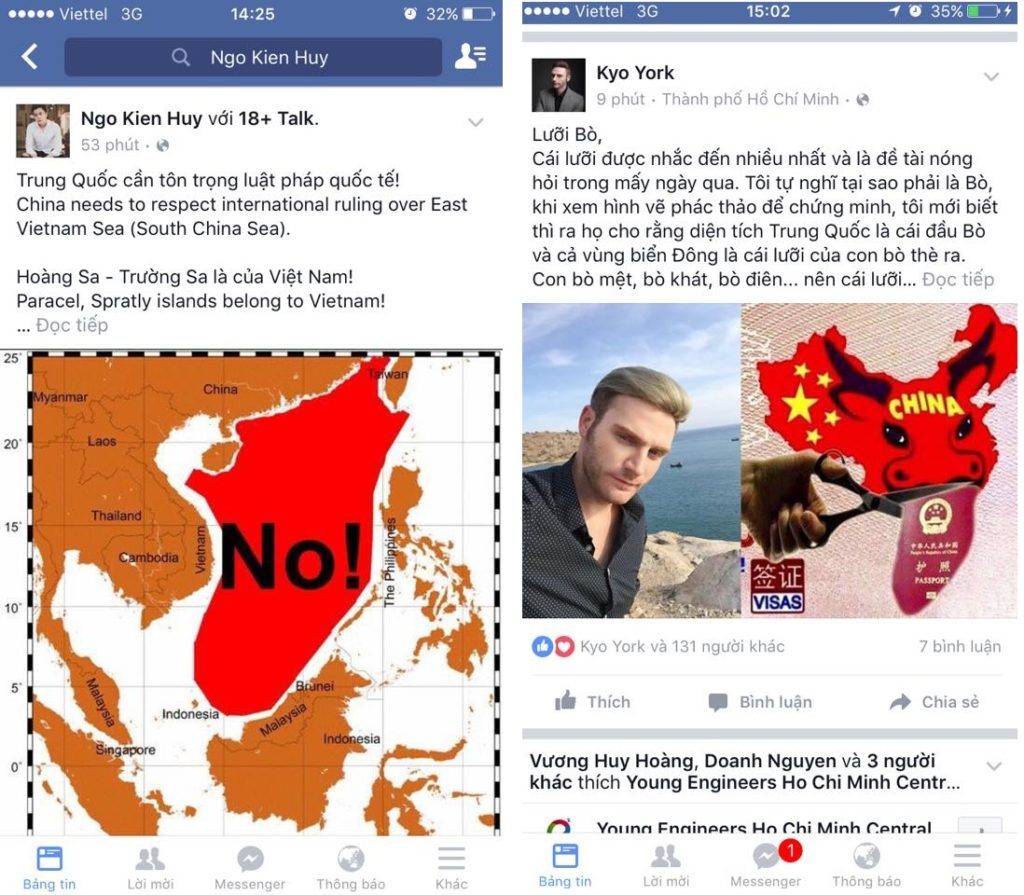
Facebook posts denouncing China’s nine-dash-line (known in Vietnam as the cow-tongue-shape line), widely shared on social media by Vietnamese celebrities.
One netizen said, “It’s been so long since I last watched Chinese dramas. Vietnamese films and dramas are always unfairly subjected to too much censorship. But Chinese films enjoy great leniency and are imported in excessive numbers.” Others were more caustic in their remarks, referring to Chinese as “Tau Cong Trung Cong” – “Communist chinks” and sarcastically praised the brainwashing, state-controlled Chinese media. Some even went as far as calling for a boycott of Chinese films and music and renewed interest in the Vietnam’s entertainment industry.
Vietnamese celebrities, themselves avid social media users, couldn’t wait to jump on the bandwagon. Actress and filmmaker Ngo Thanh Van went online with her denunciations, “Why would one be a lowly cow (the nine-dash line has a cow-tongue shape) when one could be a dignified dragon (a metaphor of Vietnam, based on a local myth)? Drop your demagogic rhetoric. We Vietnamese are no pliant, easily manipulated peoples.” Director Ba Vu, likewise, predicted a nationwide boycott of Chinese cinema and expressed hopes that Vietnamese films would no longer have to compete with Chinese blockbusters for audience. On the same note, Thanh Loc – an influential theatrical actor called for the young generation of Vietnam to stop “fangirling” over Chinese idols, preserve Vietnamese culture, and show their patriotism.
There are also defectors from mainstream Sino-phobia. Accomplished writer Hien Trang wrote, “All politics, whatever the kind, engages in demagogic rhetoric…War, pride, national interests are all elusive concepts that precede even our existence. We only inherit these values, and with our bigotry, reifying them” and refrained from condemning any sides. Such views, however, are notably few.
A troubled history: brothers or enemies?
While the social media uproar is relatively recent, Sino-phobia in Vietnam has long roots. In Vietnam, aversion to its menacing, Northern neighbor is as old as the country itself. Multiple Chinese conquests launched on Vietnamese land and unresolved maritime territorial skirmishes since the two countries fought a brief war in 1979 have turned the Vietnamese populace against China.
Ideological fraternity and Chinese military support during the Vietnam War notwithstanding, distrust of China runs deep, further reinforced by recent territorial disputes in the South China Sea. For outsiders, a history of this kind is what inspired Vietnamese youths’ and celebrities’ bellicosity to China’s expansionism. Their responses easily pass as just another display of anti-China sentiments in a country that has – according to renowned Vietnamese historian Duong Trung Quoc – “had too much practice” with its bullying neighbor.
But is contemporary Sino-phobia simply reflections of a troubled past?
The answer is no.
What are Vietnamese really against?
Nguyen – senior trainer of a college’s debating club in Malaysia – challenged mainstream views. He told me that he thinks double standards are at play. “Why are only Chinese boycotted for past offenses and current dispute with Vietnam?” He added, “Americans similarly have never atoned their crime in spreading Agent Orange in Vietnam during the war. Should we stop studying in the United States altogether?”
So, if we are to take seriously English historian Collingwood’s words that “All history is written from the standpoint of a particular present”, then we need to accept that in today’s Vietnam, it is discontent with Communism that has sowed widespread resentment to China. Vietnam is a country of contradictions, somehow a quasi-democracy that makes problems hard to conceal while still refusing to fix them. Vietnam’s one-party system – closely modelled after China’s Communist regime – has long drawn upon itself a heap of criticisms. Unlike China where tight control of media and information is practiced and citizens less exposed to unofficial or external sources of information, Vietnam ironically enjoys a relatively high level of openness.
“Anti-China sentiments in today’s Vietnam is not a simplistic us-versus-them discourse. Instead, it signifies internal dissent within the country.”
Though official TV and print media is subjected to heavy state-surveillance, social media and online platforms are not as tightly controlled, giving leeway to those seeking alternatives to state-sponsored, one-sided information channels. Rampant cases of corruption and infringements on freedom of speech do not as easily escape people’s notice, and increasing awareness of the suffocating political environment further enrages the populace. Disaffected citizens, for obvious reasons, transfer their routine resentment at the system to China – one of the last beacons of Communism – especially when conflicts erupt between the two countries. Sarcastic references to Chairman Mao of China or slurs like “Communist chinks”, which appeared often in Vietnamese netizens’ comments, say more about Vietnamese’s distrust of their own government than of China.
Improvements in Vietnam’s relation with China do not diffuse anti-China sentiments. On the contrary, rapprochement with China only gives people the impression that Vietnamese officials are being corrupted by the wealth China offers and is serving China’s interests at the expenses of ordinary Vietnamese citizens. Many Vietnamese also believe that, following a cyber security law that came into effect in January 2019, the same level of media control in China is now being applied in Vietnam to quell dissent, making it easier for government elites to make clandestine deals with Chinese government.
Anti-China sentiments in today’s Vietnam is not a simplistic us-versus-them discourse. Instead, it signifies internal dissent within the country. Contemporary Sino-phobia points to an anti-establishment sentiment shared by a generation hungry for change but keep being denied exactly that. Eventually, the new chapter in Vietnamese nationalism is one characterized by ideological struggles rather than ethnic and racial tensions.
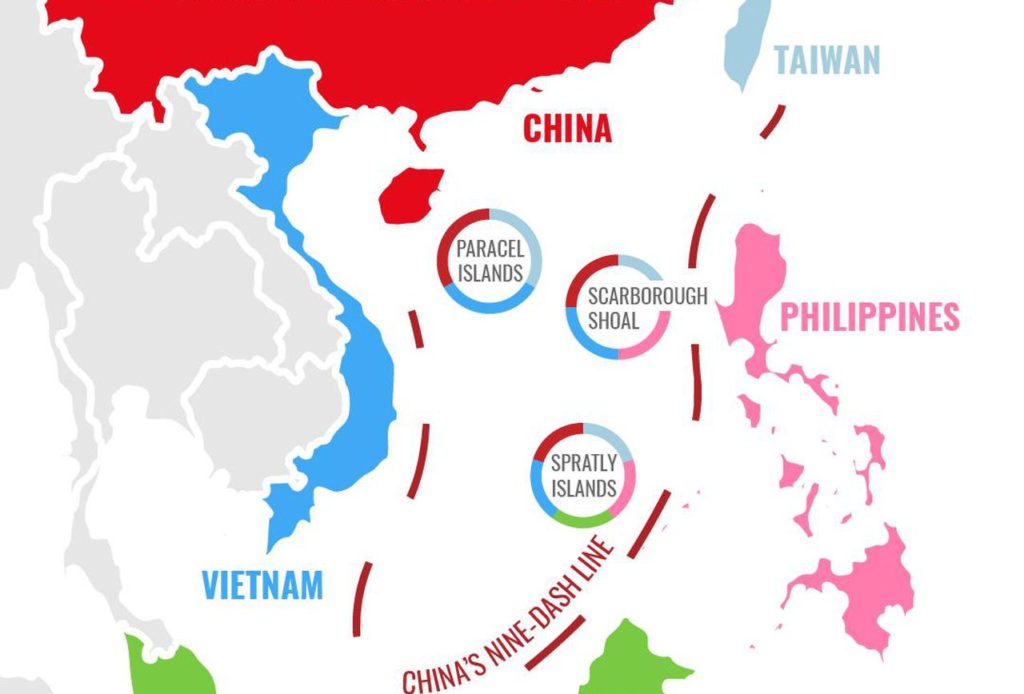
China claims that territory within the nine-dash line belongs to China. Some other contestants in the region are Vietnam, Philippines and Indonesia.
Picture: Forbes
On the cultural front, denunciations fired by Vietnamese celebrities at China’s expansionism makes for another round of anxieties – shared by almost anyone working in Vietnam’s entertainment industry. Setting aside the quality of Vietnamese films and TV programs, surviving in an environment of tight media control, where funding is scarce and the audience increasingly demanding is not easy. Foreign blockbusters often outperform Vietnamese films, and Vietnamese audiences often dismiss Vietnamese movies as being unoriginal, or of low-quality, unfairly comparing them with foreign, more developed entertainment industries.
While Vietnamese entertainers still struggle to establish their careers and make their works known, Chinese entertainers face no such struggles. China’s thousand-year domination of Vietnam has allowed Chinese cultural products to flow into the country, sometimes objected to but sometimes integrated into Vietnamese culture. The flow of Chinese culture into Vietnam, despite deep-rooted enmity between two countries, continues to this day.
Though Chinese pop music (or “C-pop”) and C-dramas have been seen as somewhat maudlin and backwards, outmaneuvered by the more modern, exciting Korean Hallyu Wave since early 2000s, the Chinese pop-culture craze still lingers on. Recently there has been renewed interest in China’s new form of romance literature and film – known as yanqing (ngon tinh in Vietnamese). It does not sit well with Vietnamese celebrities that many Chinese idols rise to stardom not necessarily through talent but good looks and sparkling personalities. Calls to boycott China’s entertainment and media are veiled attempts by Vietnamese entertainers to increase their visibility and to combat pervasive cultural cringe among many Vietnamese audiences.
At the end of the day, while patriotism and a history of antagonism plays a role in igniting contemporary Sino-phobia, it is the illiberal political environment rife with corruption and the burgeoning domestic entertainment industry’s anxiety that have impelled Vietnamese netizens and celebrities into online offensives against China’s expansionism.
Nationalism and Sino-phobia in Vietnam have turned a new chapter that resists conventional explanations. As the past retreats and the present looms near, Vietnamese residents resent China less for its past offences and more for the Communist ideology it shares with their leaders. Ultimately, the fight is not between two different peoples but between the people and their government.
Luu is an International Relations student at a Japanese university, who writes for NOVAsia under a pen-name. Her interests include Cultural Studies, Gender Relations, and Media Representations. She believes that most problems in the world can be solved if people start adopting a more human-centric and environment-centric standpoint.
- “I Love My Body”: Hwasa and Female Empowerment in K-Pop and Korean Society - May 6, 2025
- English Fever in South Korea - February 24, 2025
- South Korea’s Medical School Expansion – Cure Worse than the Disease? - October 20, 2024

